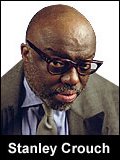
New York Daily News - News & Views Columnists - Stanley Crouch: A beastly cliché dies
A beastly cliché dies
One of the burdens of ethnicity in our culture is the idea that one is supposed to become defensive about one's genetic line outside of the United States. By the 1960s, ethnic ideologues began to tell black Americans that Africa was a sacred paradise lost and that it was supposedly distorted and demeaned in every Hollywood film, where Africans in the bush were depicted as drum-beating savages. Actually, it depended on the film, but Hollywood reflected demeaning images of black people that were common currency long before the contemporary minstrelsy of gangster rap arrived.
In that period of race theories, one could hear that the 1933 film "King Kong" was actually about something other than what it seemed. It was a fanciful tale about the boxer Jack Johnson who was brought down from the top of the world because of his love affairs with white women, or it was a metaphor for the way that Negro men were supposed to go crazy over white women, especially blonds.
It would be hard to read a movie that way today because, especially among young people, the old taboos about race and interracial dating mean very little. Certain things have had their day. One could not imagine a major studio today releasing something like the 1914 "Birth of a Nation," a masterpiece fundamentally flawed by the racism of its director, D.W. Griffith. Griffith, for all of his gifts, created a putrid fairy tale about the gallant old South and how the darkies got beside themselves when the North won the war. One was shown foaming at the mouth as he chased an innocent white woman off of a cliff. That one of the most revolting scenes, showing post-Civil War black legislators acting much like lower creatures, would fit in many a rap video today is another issue.
The upshot of the film seemed to be that the Ku Klux Klan was an understandable reaction to brutality that would not be checked until the Negro was put back in his place, or lynched whenever necessary. President Woodrow Wilson, who had been the president of Princeton, had the film shown at the White House and said of it that it taught history with lightning. I guess men with red necks festering in their souls always appreciate each other.
Given such a history in Hollywood, one might look at the new "King Kong" as an update of racist images in the way that too many rap videos continue to be, regardless of intent. But I don't think that was the intent, even in 1933. What I do know is that when I was growing up in Los Angeles, I met men who were picked up on Central Ave. before dawn to play extras in jungle movies - and were glad for the jobs whenever they got them, which might explain the buffoon tradition maintained by black actors in film and TV comedies today.
But what made the original "Kong" such an enduring cinematic fairy tale was that, like all good fairy tales, it was rooted in our fears and our realities. When Kong looks at the blood on his finger that has come from a wound delivered by the machine guns mounted on airplanes he has never seen before and does not understand, the giant ape realizes that he is not safe on the tallest building and that his life is threatened by an unknown and unexplainable force. Whatever greatness "King Kong" has is rooted not in special effects but in the universal recognition of vulnerability and imminent destruction. Neither of those things is lost in the spectacular remake, but they are absent far too often from anything set in our simpleminded world of ethnic reduction, where dull fantasies and clichés continue to dominate.
Originally published on December 14, 2005
schalom!
ReplyDelete